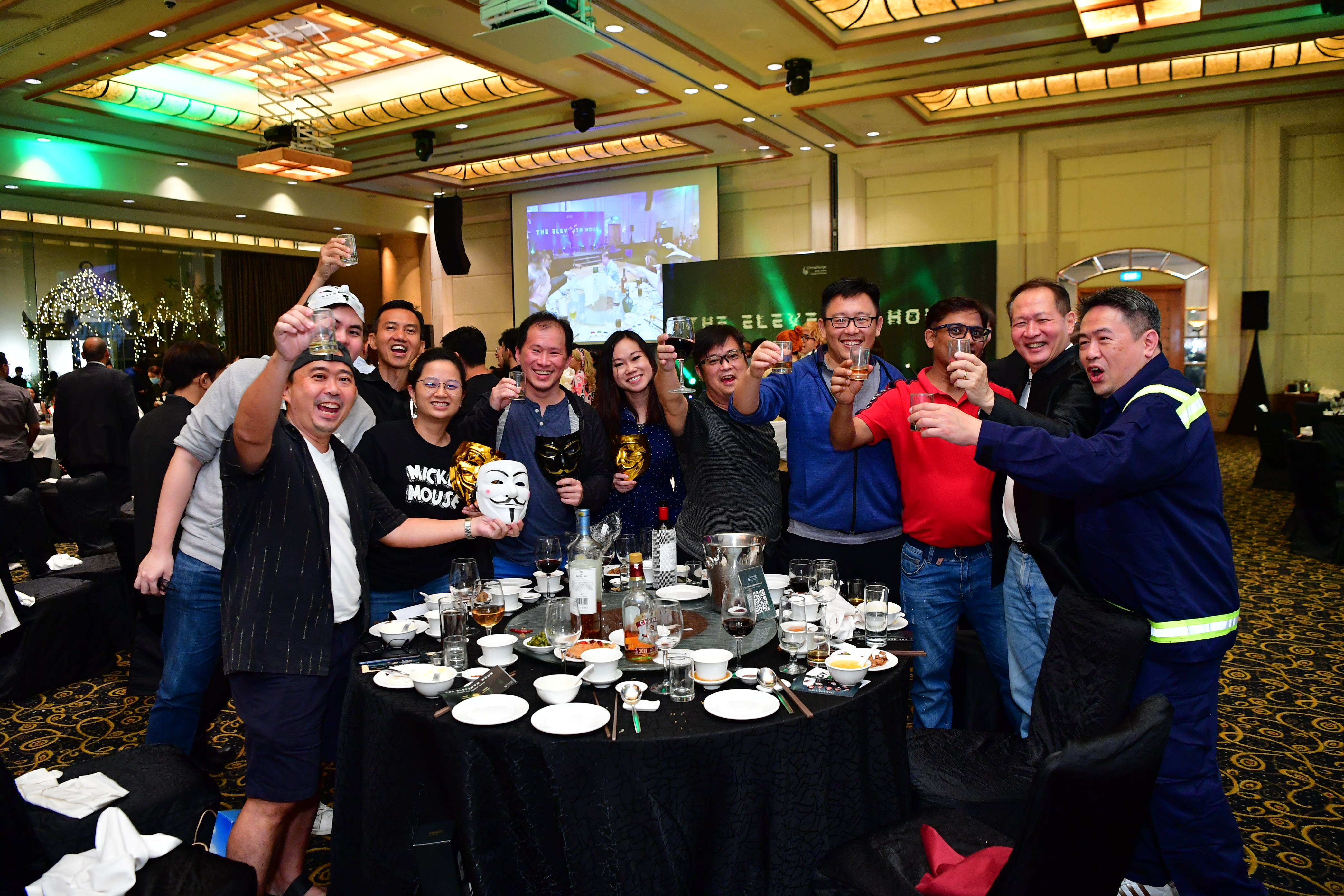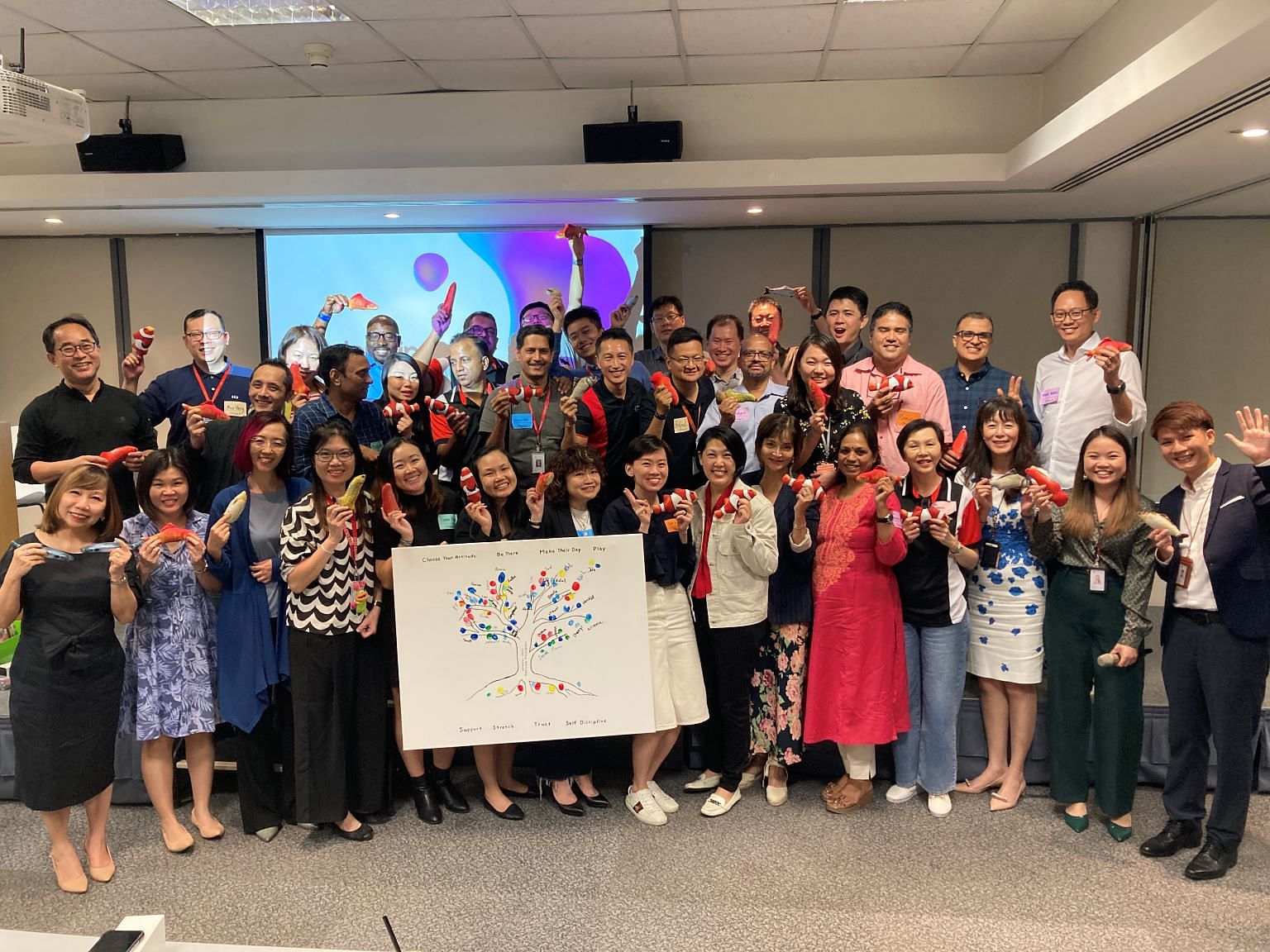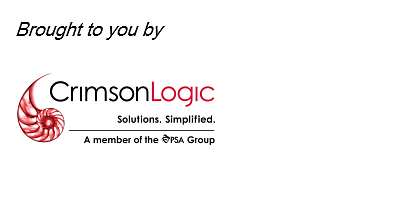BRANDED CONTENT
Incentives to be positive and kind to one another: How home-grown tech firm fosters a fun and fulfilling workplace
Staff at CrimsonLogic are not only encouraged to maximise opportunities for upskilling and job rotations, but also foster a sense of community at work

Head of platforms at CrimsonLogic Riyadi Ho (fifth from left) and his team at the company’s annual dinner and dance last year.
PHOTO: CRIMSONLOGIC
Rachel Chia
Follow topic:
During last year’s Black Friday sale, Mr Quek You Ting splashed out $250 on noise-cancelling headphones as a treat for himself.
The gadget was, in fact, free – with the 30-year-old lead product analyst having “earned” the money in the form of points given to him by colleagues in 2022.
At home-grown technology firm CrimsonLogic where Mr Quek works, staff can award rewards points to colleagues who have made their day. These can be converted to vouchers for use at major retailers such as Amazon.
This is part of the company’s efforts to create a workplace culture based on the FISH! Philosophy, which is a framework derived from learnings around why fishmongers at Seattle’s Pike Place Fish Market are so engaged at work.
The framework calls for workers to display four types of behaviours: “be there”, “play”, “choose your attitude” and “make their day”.
These tenets are not just “wordings on the wall”, says head of platforms Riyadi Ho, 38, citing how CrimsonLogic has conducted fun and activity-driven annual trainings on the FISH! Philosophy for the past three years.
A warmer place to work
The training has paid off, says Mr Ho, as it has helped him consolidate his thinking around how to better manage his team of 17 in the data platforms department.
For example, he budgets ample free time at the start of each project so staff can explore innovations to optimise their work. This period of “playing” with new ideas can range from a week to a month.
“If you load your team at 100 per cent capacity, they won't have any spare time to try new tools,” says Mr Ho.
Meanwhile, the call to “be there” has encouraged him to show more empathetic leadership, such as allowing a new mother to work from home four days a week or permitting a foreign staff member to work remotely as he had not seen his family for years due to the Covid-19 pandemic.

Both Mr Ho and Mr Quek have also learnt the importance of “choosing their attitudes” and attend about three training courses in soft skills each year, addressing key areas such as communication, leadership and resilience.
For Mr Ho, being made aware about different communication styles has helped him connect better with colleagues from other departments.
“Communication may not be smooth with certain people, not because they don't like you but because they have a different style, so we have to find a middle ground,” he says.
As for Mr Quek who works with a team of four, he learnt to motivate staff and “de-escalate heated situations” with clients.
“As a software engineer, you have your hard skills, but when you are managing a team, it is a whole different ball game,” he says.
Developing both hard and soft skills
Beyond soft skills that help its employees grow more holistically, the company – which is ranked among the top 250 employers in a list compiled by global research firm Statista and The Straits Times – also offers technical training in areas such as data analytics, a popular choice among staff.
Mr Quek, for one, looks forward to the company’s annual half-day Learning Festival, where several vendors, including NTUC LearningHub and SkillsFuture Singapore, present industry trends and latest courses for skills development and continuing education. Staff can get a career consultant to create a personalised training plan, with courses recommended based on their personality, interests and job scope.
Beyond this, CrimsonLogic’s culture encourages job rotations that can help further career growth. Both Mr Quek and Mr Ho have enjoyed three rotations each. Mr Ho previously worked in solutions architecture and product engineering, where he gained exposure through overseas projects in countries such as Fiji.
Meanwhile, Mr Quek joined CrimsonLogic’s two-year graduate programme in 2017 as a software engineer and was given three overseas rotations to the Eastern Caribbean, Kazakhstan and the United Arab Emirates to roll out a system enabling lawyers to file litigation paperwork online.
“As a software engineer, you are only concerned with functional features, not design thinking,” he says. “However, the programme enabled me to meet users, stand in the customer’s shoes and see how the solution can change an entire region's processes.”
He later became a business analyst in the team that created a software that allowed users to sign in to government services using SingPass.
“It is a product that many people are interested in. I thought, why can’t I take this and use my domain knowledge to make it a holistic package, along with other value-added services?” Mr Quek recounts.
The valuable experiences gained from job rotations empowered him to land his current role in product management, as head of the team creating the proposed service.
Mr Ho says managers at CrimsonLogic do as much as they can to realise the career trajectories staff desire.
“This is part of retaining talent,” he adds. “If you do not give people that opportunity and freedom, they will find it somewhere else.”


